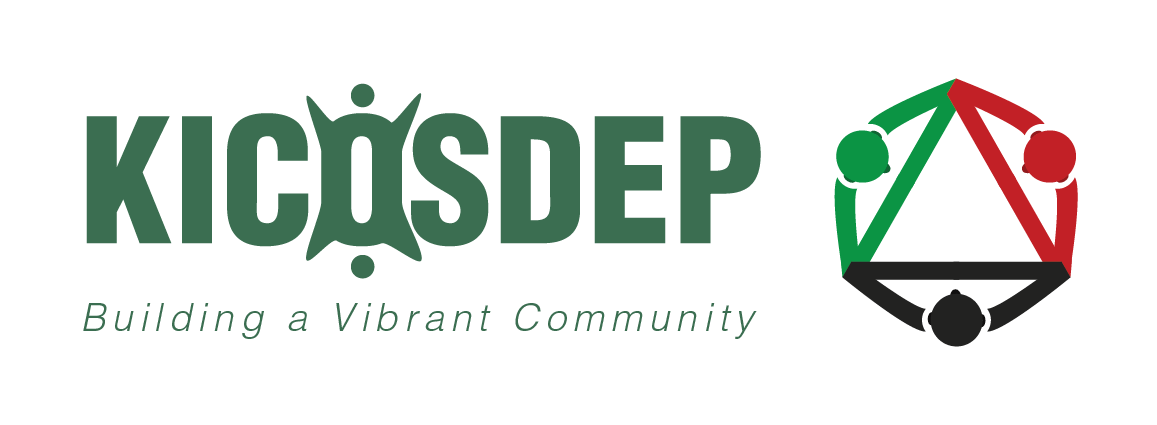
Plate Of Hope

& Disaster

Girls

& Credit
ABOUT
OUR GOALS
KICOSDEP was founded in the year 2001
ABOUT
KIBERA SLUMS
Kibera is within the city of Nairobi in Kenya. There are approx 1.2 million slum dwellers in the Kibera in an area of 2.5 square kilometres living below the international extreme poverty line of $1.25 a day as defined by the World Bank.
More..
The Government owns all the land. 10% of people are shack owners and many of these people own many other shacks and sub-let them. All the rest are tenants with no rights.
The average size of shack in this area is 12ft x 12ft built with mud walls, screened with concrete, a corrugated tin roof, dirt or concrete floor. The cost is about Ksh 700 per Month (£6). These shacks often house up to 8 or more, many sleeping on the floor.
All the people are African. The original settlers were the Nubian people from the Kenyan/Sudanese border – they now occupy about 15% of Kibera, are mostly Muslim and are also mostly shack owners. The other shack owners are mostly Kikuyu (the majority tribe in Nairobi) – although in most cases they do not live there but are absentee landlords. The majority of the tenants are Luo, Luhya and some Kamba – these people are from the west of Kenya. There are many tensions in Kibera, particularly tribal tensions between the Luo & Kikuyu, but also between landlord and tenant and those with and without jobs.
Only about 20% of Kibera has electricity. UN-Habitat is in the process of providing it to some parts of Kibera – this will include street lighting, security lighting and connection to shacks (this costs Ksh 900 per shack, which in most cases is not affordable).
WELCOME

Kibera Community Slum Development Program Welcomes You. We are located in Silanga Village at the heart of Kibera Slums in Nairobi Kenya, the largest slum in Sub- Saharan Africa with an estimated population of between 600,000 and 1.2 million, Kibera Community Slum Development Program offers an impressive curriculum of school programs, activities, Sunday school classes, and Church services for children and adults alike.
Kibera Community Slum Development Program offers every orphan and vulnerable child an opportunity to attend school and attain the universally required basic education. Our program is also dedicated to fostering the emotional and physical enrichment and development of children and youths aged 3-18 and cultivate good values and skills that will lead to positive behaviour.
HOW
the journey
started
Extreme poverty rates have been cut by more than half since 1990. While this is a remarkable achievement, one in five people in developing regions still live on less than $1.25 a day, and there are millions more who make little more than this daily amount, plus many people risk slipping back into poverty.
Poverty is more than the lack of income and resources to ensure a sustainable livelihood. Its manifestations include hunger and malnutrition, limited access to education and other basic services, social discrimination and exclusion as well as the lack of participation in decision-making. Economic growth must be inclusive to provide sustainable jobs and promote equality.
Goal 1:
End poverty
in all its forms everywhere
Goal 2:
End hunger,
achieve food security and improved nutrition and promote sustainable agriculture
If done right, agriculture, forestry and fisheries can provide nutritious food for all and generate decent incomes, while supporting people-centred rural development and protecting the environment.
Right now, our soils, freshwater, oceans, forests and biodiversity are being rapidly degraded. Climate change is putting even more pressure on the resources we depend on, increasing risks associated with disasters such as droughts and floods. Many rural women and men can no longer make ends meet on their land, forcing them to migrate to cities in search of opportunities.
A profound change of the global food and agriculture system is needed if we are to nourish today’s 795 million hungry and the additional 2 billion people expected by 2050. The food and agriculture sector offers key solutions for development, and is central for hunger and poverty eradication.
Links
International Fund for Agricultural Development
Food and Agriculture Organization
World Food Programme
UNICEF – Nutrition
Zero Hunger Challenge
Think.Eat.Save. Reduce your foodprint.
Obtaining a quality education is the foundation to improving people’s lives and sustainable development. Major progress has been made towards increasing access to education at all levels and increasing enrolment rates in schools particularly for women and girls. Basic literacy skills have improved tremendously, yet bolder efforts are needed to make even greater strides for achieving universal education goals. For example, the world has achieved equality in primary education between girls and boys, but few countries have achieved that target at all levels of education.
UN Educational, Scientific and Cultural Organization
Goal 3:
Ensure inclusive
and quality education for all and promote lifelong learning
OUR SERVICE & PROGRAM
Silanga village community members

FEEDING PROGRAM
Plate Of Hope Feed A Child

NCOC Academy
Providing free basic education

KIBERA KIDS’ BIBLE CLUB
Minister to spiritual needs

VITAL GIRLS’ EMPOWERMENT PROGRAM
Raising Girls of Excellence

ZIMAMOTO MITAANI
Saving Lives and Livelihoods

STEM EDUCATION
Science, technology, engineering and mathematics

SAVING & CREDIT
Breaking the cycle of poverty

NAIROBI CHRISTIAN OUTREACH CENTRE CHURCH
The right trainer for you
our:
NEWS
& UPDATES
There’s always something fun and exciting happening at Kibera Community Slum Development Program — we’re always on the move with new activities and enriching programs.
We like to keep you informed about what’s happening at our center and what’s going on in the Kibera slum community.





